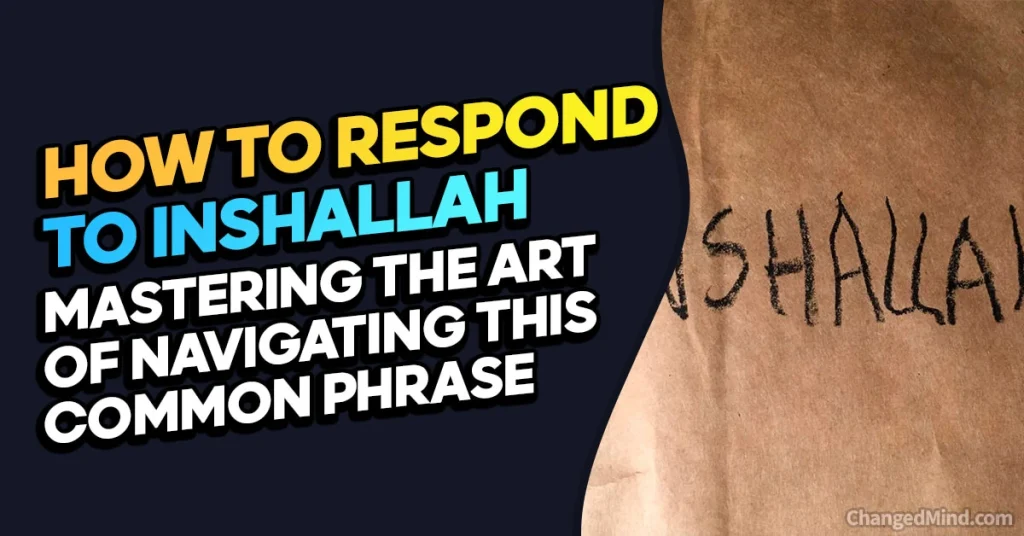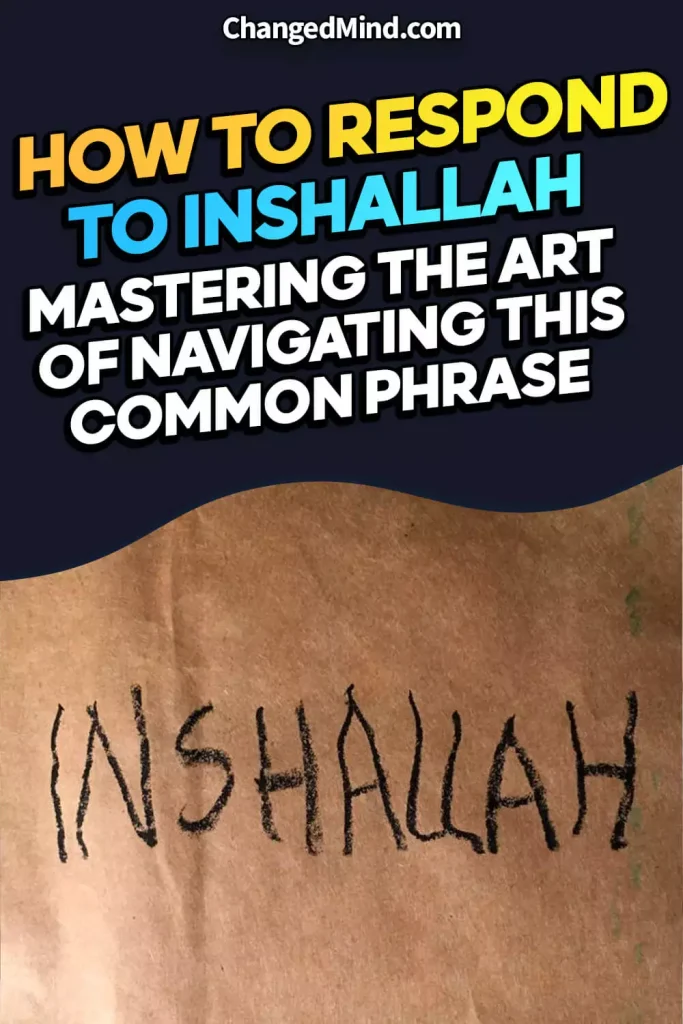Tired of being left hanging with an “Inshallah”? Don’t worry, we’ve got the perfect guide for you!
In this article, we’ll unravel the mystery behind responding to the infamous “Inshallah” and help you navigate this common phrase with ease. Whether you’ve encountered it in a casual conversation or a business setting, we’ll provide you with practical tips and witty comebacks to keep the conversation going.
So, How To Respond To Inshallah?
The short answer: with humor, understanding, and a touch of playfulness. In this article, we’ll dive into the reasons why these strategies work and arm you with clever responses that will leave everyone chuckling.
Here’s what we’ll cover:
- Decoding the meaning behind “Inshallah”
- Responding with humor and wit
- Cultivating understanding and empathy
- Building bridges through playful banter
Get ready for an enlightening read that will equip you with the skills to navigate the intriguing world of “Inshallah” conversations!
Understanding the cultural nuances and appropriate responses to phrases used in different contexts is essential for effective communication. “Inshallah,” an Arabic phrase commonly used by Muslims, holds significance and can be encountered in various situations. Here, we will delve into understanding the meaning of “Inshallah” and explore common contexts in which it is used.
“Inshallah” translates to “If Allah wills” or “God willing” in English. It reflects a belief in the Islamic faith that ultimate control rests with a higher power, and future outcomes are subject to divine intervention. It is often used to express hope, uncertainty, or as a humble recognition of one’s limited control over the future.
“Inshallah” is frequently used in religious contexts such as prayers, discussions about religious events or practices, or when expressing faith-related hopes and aspirations.
In cultural settings, “Inshallah” is used to express a general sense of hope or to imply that something is likely to happen in the future, but with a recognition of the uncertainty of worldly matters.
In social settings, “Inshallah” can be used to respond to invitations, commitments, or plans. It may indicate willingness, but also a reminder that the final outcome is subject to external factors.

When someone uses “Inshallah” in a conversation, it is essential to respond appropriately. Here are some appropriate responses to consider:
Acknowledge the sentiment behind “Inshallah” and show understanding of the person’s intention or hope.
If “Inshallah” is used to respond to an invitation or suggestion, accept the response graciously, understanding that their willingness is subject to external factors.
Express gratitude for the person’s hope or intention, showing appreciation for their consideration and acknowledging the uncertainty of future outcomes.
When responding to “Inshallah,” it is important to consider the following:
Respect the cultural significance of the phrase and the underlying religious beliefs associated with it. Approach the conversation with an open mind and a willingness to understand and appreciate different perspectives.
Respect personal beliefs and choices when responding to “Inshallah.” Avoid imposing your own beliefs or making assumptions about the person’s intentions solely based on their use of the phrase.
Misinterpretations can occur when responding to “Inshallah.” Here are two misinterpretations to avoid:
Avoid assuming that the use of “Inshallah” implies disinterest or a lack of commitment. Recognize that it is a cultural and religious expression with a broader meaning.
Misconstruing “Inshallah” as a brush-off or a way to avoid commitment is inaccurate. Instead, understand that it reflects humility and a recognition of the uncertainties of life.
When engaging in conversations involving “Inshallah,” it is helpful to follow these etiquette and politeness guidelines:
Listen actively to the person using “Inshallah” and seek to understand their perspective before formulating a response. This demonstrates respect and fosters effective communication.
If you are unsure about the person’s intended meaning or how to respond appropriately, respectfully seek clarification without making assumptions or judgments.
By understanding the meaning, appropriate responses, and cultural considerations associated with “Inshallah,” you can navigate conversations with sensitivity, respect, and effective communication.
Key takeaways:
- Understanding the meaning of “Inshallah”: It is important to comprehend the significance of “Inshallah” which is used to express hope, reliance on God, and a sense of uncertainty.
- Appropriate responses to “Inshallah”: When someone uses “Inshallah,” it is appropriate to acknowledge the intent, respond with respectful acceptance, and express gratitude for the consideration.
- Considerations when responding to “Inshallah”: It is crucial to be culturally sensitive and respect personal beliefs when responding to “Inshallah.” Understanding the context and avoiding misinterpretations is also important.
Understanding the Meaning of “Inshallah”
To have a better understanding of the meaning of “Inshallah,” individuals can engage in more effective and respectful communication with members of the Muslim community. “Inshallah” is an Arabic phrase that translates to “if Allah wills” or “God willing.” It holds deep religious significance and is widely used in the Muslim community.
- Religious Connotation: “Inshallah” reflects a belief in the concept of divine destiny and acknowledges that everything is ultimately in God’s control. It reminds Muslims that all actions are subject to the will of God.
- Cultural Importance: “Inshallah” is not only a religious phrase, but also a cultural one. It represents the humility and submission felt by individuals towards a higher power. Muslims use it in various contexts, such as making plans, expressing hopes, or discussing future events.
- Hope and Optimism: When used in conversations, “Inshallah” signifies hope and optimism. It conveys the idea that something will happen if God permits, adding a sense of positivity and acceptance. It also serves as a reminder that outcomes are ultimately determined by a higher power.
- Social Etiquette: Understanding the meaning of “Inshallah” is crucial for respectful communication. When someone responds with “Inshallah” to a request or invitation, it indicates a conditional affirmation. It means that they intend to fulfill the request or attend the event, provided that there are no unforeseen circumstances or obstacles.
- Language Nuances: The usage of “Inshallah” can vary in different contexts. It can convey sincerity, politeness, or a genuine desire for something to happen. It is essential to interpret it within the cultural and social context of the conversation.
By understanding the meaning of “Inshallah,” individuals can engage in more effective and respectful communication with members of the Muslim community. This understanding promotes cultural awareness, inclusivity, and stronger relationships with those who hold this phrase close to their hearts.
Common Contexts in Which “Inshallah” is Used
In various contexts, the word “Inshallah” holds significance and carries diverse implications. Exploring its usage, we will uncover the common contexts where this term finds its place. From religious significance to cultural and social implications, we will delve into each sub-section revealing the intricacies and impact of “Inshallah” in different settings. Get ready to uncover the rich tapestry of meaning behind this ubiquitous phrase.
Religious Context
In the religious context, the significance of “Inshallah” for Muslims is deeply rooted in their faith and belief system.
- Derived from Arabic, “Inshallah” translates to “If God wills” or “God willing”.
- When used in conversations, “Inshallah” expresses the acknowledgement of God’s control over all outcomes and the belief that everything happens according to His will.
- It showcases humility and a recognition that human plans are subject to divine intervention.
- For Muslims, incorporating “Inshallah” into their speech showcases their faith and reliance on God in all aspects of life.
- It serves as a reminder to Muslims to constantly seek God’s guidance and be mindful of their actions.
- The use of “Inshallah” extends beyond religious discussions and is commonly used in everyday conversations to express hope, intention, or commitment.
When responding to someone who includes “Inshallah” in their statement, it is crucial to understand and respect its religious significance:
- Acknowledging the speaker’s intent is vital, as they are expressing their trust and reliance on God’s will.
- Responding with a respectful acceptance of their sentiment demonstrates an understanding and appreciation of their faith.
- Expressing gratitude for their use of “Inshallah” indicates respect for their religious beliefs.
It is important to exercise cultural sensitivity when responding to “Inshallah” to avoid misunderstandings:
- Recognize that “Inshallah” is a religious expression and should not be dismissed or disregarded as a casual statement.
- Respect personal beliefs by refraining from misinterpreting or dismissing “Inshallah” as a brush-off or lack of commitment.
By actively listening and seeking clarification when needed, individuals can navigate conversations involving “Inshallah” with respect and understanding
Pro-tip: When engaging in discussions with individuals from different religious backgrounds, it is important to educate oneself about their customs and beliefs to foster an atmosphere of mutual respect and cultural understanding.
Cultural Context
In order to fully comprehend the cultural context surrounding the term “Inshallah,” it is essential to acknowledge and appreciate its significance and usage within diverse cultures. Here are several key points to consider within this context:
1. Respect for religious beliefs: “Inshallah” is widely used among the Muslim population and holds great religious importance. This phrase, originating from Arabic, translates to “if Allah wills it” or “God willing.” It embodies the belief that everything occurs according to the divine plan.
2. Optimism and surrender: Within the cultural context, “Inshallah” reflects an optimistic outlook and a willingness to embrace the unknown. It recognizes that outcomes are ultimately under the control of a higher power, promoting acceptance of fate rather than asserting personal control.
3. Communication style: In cultural contexts, the use of “Inshallah” can convey politeness and humility. It is often employed to soften responses, particularly in discussions about uncertain future events or when making commitments.
4. Understanding cultural nuances: When encountering someone who uses “Inshallah”, it is crucial to show respect and acknowledgement for their cultural beliefs. Recognizing the significance of this phrase and responding in a thoughtful manner demonstrates cultural sensitivity and enhances effective communication.
5. Avoiding misinterpretations: It is vital to refrain from misinterpreting “Inshallah” as a sign of disinterest or indifference. Instead, it should be understood as a reflection of a belief system and cultural values. Actively listening and seeking clarification can help prevent miscommunications.
Remember, when engaging in cross-cultural interactions, it is crucial to have an open-minded and curious approach, while also showing respect for different beliefs and practices. Embracing cultural diversity enables us to establish meaningful connections and foster mutual understanding.
When it comes to the social context of Inshallah, it’s like a secret code for ‘I might show up, but don’t hold your breath‘.
Social Context
In the social context, the phrase “Inshallah” carries significant meaning and is commonly used in various situations.
Here are some key points to consider regarding its social implications:
– Social acceptance: “Inshallah” is often used to show acceptance and willingness to participate in social activities or events. When someone uses this phrase in response to an invitation, it indicates their intention to attend if circumstances permit.
– Politeness and respect: In social interactions, “Inshallah” is used as a polite way to express uncertainty or leave room for unforeseen circumstances. It demonstrates respect for the uncertainties of life and the importance of divine will.
– Cultural significance: Understanding the cultural context is essential when encountering “Inshallah” in social settings. It reflects the values and beliefs of the Muslim community and serves as a reminder of the importance of faith and trust in God.
– Faith-based conversations: In religious discussions within the social context, “Inshallah” is commonly used to express hope and trust in God’s plan. It emphasizes the belief that all outcomes are ultimately determined by a higher power.
– Maintaining open communication: When someone uses “Inshallah” in a social context, it is essential to acknowledge and respect their intention. Active listening and seeking clarification when necessary help ensure meaningful and respectful conversations.
– Avoiding misinterpretation: It is crucial not to misinterpret “Inshallah” as a brush-off or disinterest. It is a phrase deeply rooted in faith and cultural values. Understanding its significance helps prevent misunderstandings and fosters respectful communication.
Inshallah is like a magic word – it can mean anything from Sure to I’ll do it if I feel like it.
Appropriate Responses to “Inshallah”
When someone says “Inshallah,” how should you respond? Let’s dive into the art of appropriate responses to this common phrase. From acknowledging the intent behind it to showing respectful acceptance and expressing gratitude, we’ll discover the best ways to engage with “Inshallah.”
Get ready to explore the cultural nuances and learn how to navigate conversations with grace and understanding.
Acknowledging the Intent
When someone uses the phrase “Inshallah,” it is crucial to acknowledge their intent in a respectful and understanding manner. By actively listening and providing thoughtful responses, you can demonstrate that you value and appreciate their sentiment.
1. Demonstrate Understanding: Start by showing that you understand the meaning and significance of the phrase. Recognize that “Inshallah” is an Arabic phrase that translates to “if Allah wills it” or “God willing.” Understand that it is often used to express the belief in divine control over future events.
2. Respectful Acceptance: When someone uses “Inshallah,” respond with acceptance and openness. Acknowledge their hope or desire and show respect for their faith and perspective. For instance, you could say, “Thank you for sharing your plans. I hope everything goes well, Inshallah.”
3. Express Gratitude: If someone includes “Inshallah” in their statement, it is appropriate to express gratitude for their consideration and inclusion of divine will. Respond with genuine appreciation. For example, you could say, “Thank you for your kind offer. I truly appreciate it, Inshallah.”
4. Cultural Sensitivity: Be mindful of the cultural context in which “Inshallah” is used. Understand that it is a common phrase in Muslim-majority countries and among individuals of the Islamic faith. Therefore, responding with respect and understanding is essential to acknowledge their cultural beliefs and practices.
5. Avoid Misinterpretation: While it is crucial to acknowledge the intent behind “Inshallah,” it is equally important to avoid misinterpreting it. Do not assume disinterest or consider it a brush-off. Instead, recognize it as a sincere expression of trust in a higher power and the understanding that all outcomes are ultimately determined by the will of Allah.
By acknowledging the intent behind the use of “Inshallah,” you demonstrate cultural sensitivity, respect, and a willingness to engage in meaningful dialogue. This ensures that your response fosters understanding and harmonious interactions with individuals who use this phrase as an integral part of their language and faith.
Accepting ‘Inshallah‘ shows open-mindedness and cultural understanding, unless you’d prefer I negotiate with fate itself.
Respectful Acceptance
When responding to the phrase “Inshallah,” it is important to approach it with respectful acceptance. Here are some ways to appropriately respond:
- Acknowledge the intent: When someone uses “Inshallah,” they are expressing their belief that if it is God’s will, something will happen. Respond by acknowledging their belief and showing respect for their faith.
- Respectful acceptance: Show understanding and acceptance of the outcome being left to a higher power. Respond with phrases such as “Inshallah, may it be so,” or “If it is God’s will.” This communicates your respect for their belief system.
- Expressing gratitude: If someone uses “Inshallah” in response to a request or invitation, thank them for their response. For example, you can say, “Thank you for considering it” or “I appreciate your response.”
Considerations when responding to “Inshallah” include:
- Cultural sensitivity: Recognize that “Inshallah” is deeply rooted in Islamic culture and is often used as a way to surrender to God’s will. Show respect for this cultural context by responding in a considerate and open-minded manner.
- Personal beliefs: Reflect on your own beliefs and values when engaging in conversations where “Inshallah” is used. Be mindful of any potential biases or misconceptions that may arise.
By practicing respectful acceptance when responding to “Inshallah,” you can foster understanding and strengthen connections with individuals who hold this belief system.
Demonstrate appreciation with more than just a ‘thank you‘ when someone says ‘Inshallah‘.
Expressing Gratitude
Expressing gratitude is an essential aspect of responding to “Inshallah,” and it is crucial to incorporate this quality in our interactions. Here are some natural ways to express gratitude when someone uses “Inshallah” in a conversation:
- Show appreciation: When someone responds with “Inshallah” to a request or plan, acknowledge their intention and express your gratitude. Thank them for considering your request or for their well wishes.
- Express thankfulness: Let the person know that you are grateful for their response and their consideration. You can use phrases such as “Thank you for your kind words” or “I appreciate your wishes.”
- Show respect: It is important to respect the person’s belief and culture while expressing your gratitude. You can use phrases like “I respect your faith” or “I appreciate your cultural customs.”
Remember that expressing gratitude should always come from a place of sincerity and genuine appreciation. It is essential to be mindful of cultural sensitivity and personal beliefs when responding to “Inshallah.”
True story:
Once, I was planning a trip to a foreign country and sought advice and recommendations from a local acquaintance. When I shared my plans, they responded with “Inshallah.” Initially, I was unsure about how to respond, but I understood the significance of expressing gratitude in such situations. I thanked them for their well wishes and for taking the time to provide advice.
Their response showcased their respect for their cultural customs and beliefs, allowing us to engage in a meaningful conversation about our diverse perspectives. This experience served as a reminder of how expressing gratitude can foster understanding and appreciation, even in cross-cultural interactions.
Considerations When Responding to “Inshallah”
When it comes to responding to the phrase “Inshallah,” there are important considerations to keep in mind. In this section, we’ll explore two key aspects: cultural sensitivity and personal beliefs. Understanding the cultural context and being mindful of the impact of our responses is crucial.
Additionally, personal beliefs play a significant role in shaping our reactions. So, let’s dive into these considerations and discover how to navigate them with grace and respect.
Cultural Sensitivity
Acknowledging and embracing cultural sensitivity is of utmost importance when interacting with the phrase “Inshallah”. It is crucial to have an understanding and respect for diverse cultural perspectives and beliefs in order to respond appropriately and maintain a respectful and harmonious connection.
- Stay mindful of cultural norms and traditions. It is essential to show sensitivity and respect towards different cultures, recognizing that “Inshallah” is a commonly used phrase in Islamic cultures to express reliance on the will of God.
- Make an effort to comprehend the meaning and intention behind the phrase. “Inshallah” is often used to indicate hope or a positive outcome, as well as to express humility and acceptance of God’s ultimate determination of the future.
- Acknowledge and honor the intent. When someone uses the phrase “Inshallah,” they are expressing faith and trust in God. Responding with understanding and respect contributes to fostering a positive and inclusive environment.
- Show appreciation for cultural diversity. By demonstrating cultural sensitivity, you are embracing and celebrating different cultures, fostering understanding, and promoting harmonious interactions.
- Avoid making assumptions or misinterpretations. It is crucial to refrain from assuming disinterest or misconstruing “Inshallah” as a dismissal. Instead, approach the phrase with an open mind and a willingness to learn and understand.
Cultural sensitivity plays a significant role in promoting mutual respect and understanding. By being aware of and respecting cultural differences, you can effectively respond to the phrase “Inshallah” in a considerate and inclusive manner.
Personal Beliefs
When responding to the phrase “Inshallah,” it’s important to take into consideration your own Personal Beliefs. Your Personal Beliefs may shape how you interpret and respond to the phrase. Here are some considerations to keep in mind:
1. Respect for religious beliefs: “Inshallah” is a phrase commonly used in Islamic culture, meaning “if God wills.” If you share similar religious beliefs, responding to “Inshallah” with understanding and acceptance can show respect for the religious context in which it is used.
2. Open-mindedness: Even if your Personal Beliefs differ from those associated with “Inshallah,” it’s important to approach conversations and interactions with an open mind. Acknowledge the beliefs and values of others, even if they may not align with your own.
3. Cultural sensitivity: Recognize that “Inshallah” is deeply rooted in Islamic culture and is an integral part of communication for many individuals. Being sensitive to different cultural practices and beliefs can help foster understanding and meaningful connections.
4. Avoid misconceptions: While Personal Beliefs shape our responses, it’s crucial to avoid misinterpreting or generalizing the phrase “Inshallah.” Every individual may have unique intentions when using it, so it’s essential to seek clarification and actively listen to understand the specific meaning behind its use.
5. Embrace diversity: Personal Beliefs vary greatly among individuals. Embracing this diversity and engaging in respectful dialogue can lead to enhanced understanding and appreciation for different perspectives.
6. Foster positive interactions: Regardless of Personal Beliefs, responding to “Inshallah” with kindness, acceptance, and gratitude can contribute to meaningful conversations and respectful exchanges.
Remember, when responding to “Inshallah,” consider your own Personal Beliefs, be respectful of others’ cultural and religious practices, and aim to foster understanding and acceptance through positive interactions.
Don’t jump to conclusions when someone says Inshallah, they might actually mean it, I swear.
Misinterpretations to Avoid
Misinterpreting the word “Inshallah” can lead to misunderstandings and miscommunications. In this section, we will uncover the common misinterpretations to avoid when encountering this phrase. From assuming disinterest to misconstruing it as a brush-off, we’ll delve into the potential pitfalls and shed light on the true meaning behind “Inshallah” in different contexts. So, let’s navigate through these misconceptions and gain a deeper understanding of this culturally loaded expression.
Assuming Disinterest
Assuming disinterest is a common misinterpretation when responding to the phrase “Inshallah.” It is important to be mindful of this and avoid jumping to conclusions. Here are some key points to consider when encountering this situation:
- Active listening: When someone says “Inshallah,” it is crucial to actively listen and understand the context. It is not a direct indication of disinterest but rather a statement acknowledging that outcomes are ultimately in the hands of a higher power.
- Avoid misconstruing it as a brush-off: Assuming that the use of “Inshallah” implies disinterest can lead to misunderstandings and strained relationships. It is essential to remember that this phrase is deeply rooted in faith and should not be seen as a dismissive response.
- Seek clarification: Instead of assuming disinterest, it is helpful to seek clarification by asking follow-up questions. This can foster better communication and a deeper understanding of the other person’s intentions.
- Cultural sensitivity: Being aware of cultural differences and norms is crucial. Understanding that “Inshallah” holds religious and cultural significance can help avoid making assumptions and misinterpretations.
- Respect personal beliefs: Respecting the beliefs and values of others is essential in any interaction. Recognize that the use of “Inshallah” is a way for individuals to express their faith and trust in a higher power.
By avoiding assumptions of disinterest when encountering the phrase “Inshallah,” we can foster better understanding and enrich our cultural interactions. It is essential to approach conversations with an open mind and a willingness to learn about different belief systems and customs.
Misconstruing It as a Brush-off
It is essential to exercise caution when responding to “Inshallah” to prevent misconstruing it as a brush-off. This understanding will aid in fostering effective communication and maintaining positive relationships. Here are a few important points to consider:
1. Practice Active Listening: Instead of dismissing “Inshallah” as a means of avoiding commitment, approach it as an affirmation of intention. Actively listen to the words and the context in which they are used to comprehend the underlying meaning and intent.
2. Seek Clarification: If you are uncertain about the intended meaning behind “Inshallah,” it is best to seek clarification rather than jumping to conclusions. Ask open-ended questions to encourage further explanation and gain a better understanding of the person’s perspective.
3. Cultural Sensitivity: Recognize that “Inshallah” has deep roots in Islamic culture and holds significant religious connotations. Avoid assuming that it is used as a brush-off or a means to ignore your request. Instead, appreciate and respect the cultural significance behind the phrase.
4. Consider Personal Beliefs: Keep in mind that different individuals may have different beliefs and interpretations of “Inshallah.” Understand that their response may not align with your own expectations or cultural background. Embrace diversity and approach conversations with an open mind.
Etiquette and Politeness Guidelines
Discover the art of responding to “Inshallah” with grace and respect. In this section, we’ll explore essential etiquette and politeness guidelines that can enhance communication. From practicing active listening to seeking clarification, we’ll uncover the key strategies to understand and respond to “Inshallah” appropriately. Prepare to navigate cultural nuances and foster meaningful connections through effective communication techniques.
Active Listening
Active listening is an essential skill that can greatly enhance communication and understanding. When engaging in active listening, one must:
- Pay full attention to the speaker, avoiding distractions or interruptions.
- Maintain eye contact and use attentive body language to show interest and engagement.
- Listen without interrupting or formulating responses in one’s mind.
- Ask clarifying questions to ensure a complete understanding of the speaker’s message.
- Paraphrase or summarize the speaker’s key points to demonstrate comprehension.
- Show empathy and validate the speaker’s feelings or emotions.
Active listening promotes effective communication by fostering trust and respect in the conversation. It allows for a deeper understanding of the speaker’s perspective and encourages open dialogue. By practicing active listening, conflicts can be resolved, relationships can be strengthened, and meaningful connections can be established.
Moreover, active listening helps to:
- Build strong interpersonal relationships by establishing mutual understanding and trust.
- Enhance professional growth by actively engaging in discussions and learning from others.
- Improve problem-solving skills by gathering all relevant information and perspectives before formulating a solution.
- Facilitate effective teamwork and collaboration by ensuring that all team members feel heard and valued.
- Cultivate a positive and inclusive work environment by promoting respect and empathy.
Active listening is a powerful tool that enables individuals to better connect with others, foster harmonious relationships, and promote effective communication in various personal and professional settings.
Seeking Clarification
When seeking clarification, it is important to keep a few tips in mind. If someone uses the phrase “Inshallah”, it may be necessary to ask for elaboration to fully understand their intentions or meaning. One way to do this is by politely requesting more details. For example, you can say, “Could you please provide more information?” This allows the person to provide additional context and helps you better grasp their response.
Another helpful strategy is to ask open-ended questions instead of simple yes or no inquiries. By encouraging the person to explain their perspective, you can gain a clearer understanding of what they mean by “Inshallah” in a particular context. Questions such as “What do you mean by ‘Inshallah’ in this situation?” or “How does ‘Inshallah’ relate to our discussion?” promote a deeper conversation and foster better understanding.
Seeking cultural insights is also valuable when seeking to understand the significance of “Inshallah” if you are unfamiliar with it. Researching or consulting someone knowledgeable about the culture can provide you with valuable insights and help you interpret the phrase more accurately.
In addition to the words spoken, paying attention to non-verbal cues such as body language and tone of voice can provide additional information about someone’s intentions or level of confidence in their response.
Paraphrasing what the person has said is another useful technique for seeking clarification. By restating their words, you demonstrate active listening skills and give them an opportunity to confirm or clarify their original statement.
Remember, seeking clarification is about fostering better understanding and communication. Approach the conversation with respect and an open mind to navigate cultural differences effectively.
Pro-tip: Seeking clarification shows respect for diverse perspectives and promotes effective communication.
Some Facts About How To Respond To Inshallah:
- ✅ Insha Allah is an Arabic phrase that means “If Allah wills it” or “God willing.” (Source: Our Team)
- ✅ It is a common phrase used by Muslims when talking about future events or plans. (Source: Our Team)
- ✅ The appropriate response to Insha Allah is to repeat it or some other response showing acceptance. (Source: Our Team)
- ✅ There is no fixed response to Insha Allah, one can nod, smile, say Insha Allah, or respond in other ways. (Source: Our Team)
- ✅ Insha Allah is not the same as Ameen which is said in prayers, while Insha Allah is used when waiting for something to happen. (Source: Our Team)
Frequently Asked Questions
How should I respond when my Muslim friends say “Insha Allah”?
When your Muslim friends say “Insha Allah,” it is appropriate to respond by saying either “Insha Allah” or any other phrase that conveys a positive sentiment or shows your agreement and support.
What does “Insha Allah” mean in Arabic?
“Insha Allah” is an Arabic phrase that means “If Allah wills it” or “God willing.” It is commonly used by Muslims when talking about future events or plans.
Is it recommended to say “Insha Allah” in Islamic teachings?
Yes, saying “Insha Allah” is considered a good thing and is recommended in Islamic teachings. It reflects a person’s reliance on Allah for guidance and support in all their plans and actions.
Can I respond with a different phrase instead of saying “Insha Allah”?
While the customary response to “Insha Allah” is to repeat it, you can also respond with other positive phrases like “Sure,” “Sounds good,” or “Okay.” The key is to convey your agreement or support for the future event or plan being discussed.
How do you pronounce “Insha Allah”?
“Insha Allah” is pronounced as “in-shal-lah.” Each syllable should be pronounced distinctly and evenly.
What is the opposite of “Insha Allah”?
The opposite of “Insha Allah” is “Hamdullah,” which means “thank God” and is used to express gratitude for something good that has already happened.







